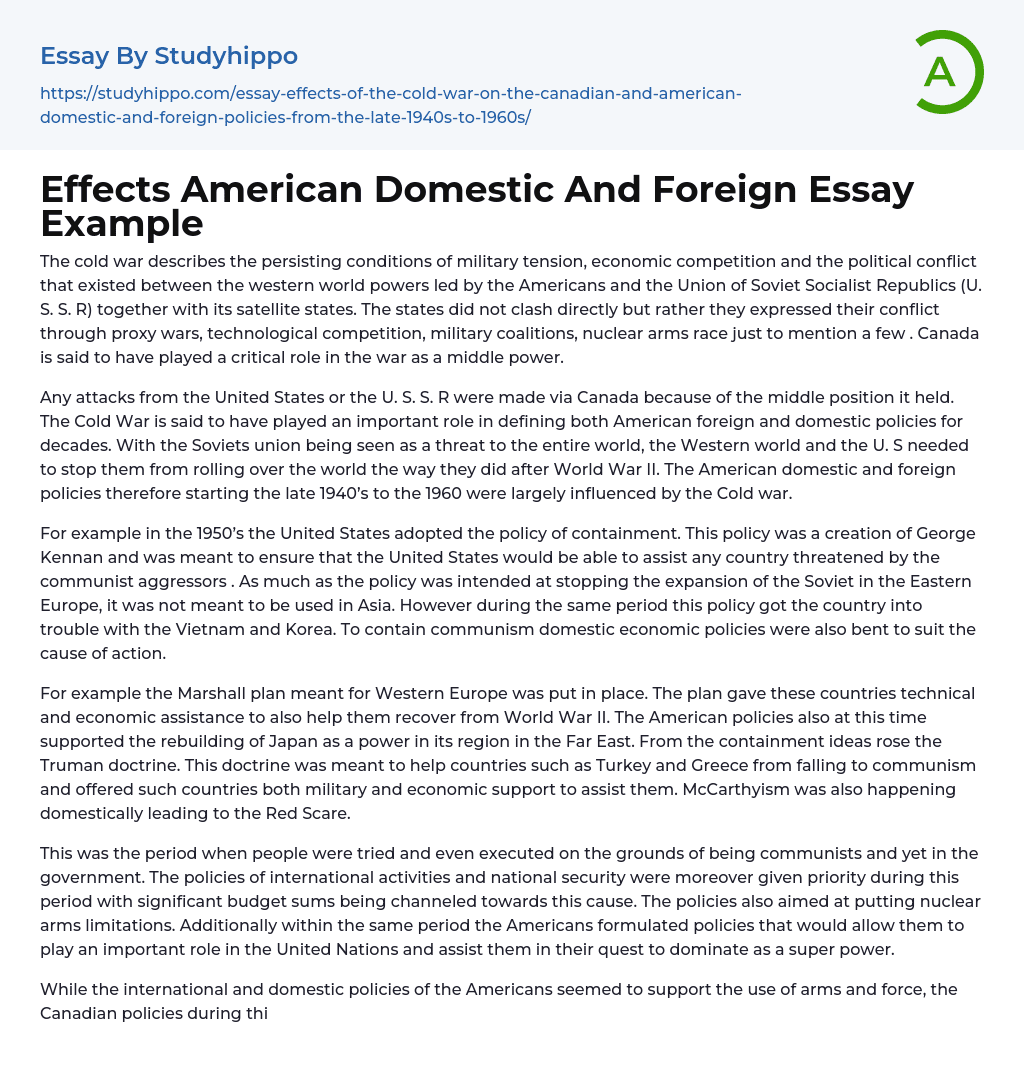The Cold War was a period of military tension, economic competition, and political conflict between the western world powers (led by the Americans) and the Union of Soviet Socialist Republics (U.S.S.R) and its satellite states. Rather than directly confronting each other, these nations expressed their differences through proxy wars, technological rivalry, military alliances, and a race to develop nuclear weapons. Canada played a crucial role as an intermediary power during this war.
Canada, due to its strategic location, was vulnerable to attacks from both the United States and the U.S.S.R. The Cold War had a profound effect on American foreign and domestic policies, molding them for an extended period of time. The Soviet Union was perceived as a worldwide menace, leading the Western world, including the U.S., to strive in thwarting their dominance after World War II. Consequent
...ly, from the late 1940s to the 1960s, the Cold War significantly shaped American policies in both domestic and foreign affairs.
In the 1950s, George Kennan devised containment, a policy introduced by the United States to assist nations confronting communist aggression. The main goal was to restrain Soviet expansion in Eastern Europe without extending it to Asia. However, implementing this policy presented difficulties for the US in Vietnam and Korea. Additionally, domestic economic measures were adjusted to support the containment of communism.
The Marshall plan provided technical and economic aid to Western European countries for post-World War II recovery. Additionally, American policies aimed to rebuild Japan as a dominant force in the Far East. The containment concept inspired the Truman doctrine, which offered military and economic support to prevent Turkey and Greece from
falling into communism. At the same time, McCarthyism led to the Red Scare within domestic boundaries.
In this period, people were prosecuted and sometimes killed for being communists and having government roles. The government focused on international activities and national security, dedicating considerable budget resources to these efforts. Additionally, the policies aimed to impose limitations on nuclear weapons. Furthermore, Americans devised tactics to exert influence in the United Nations and achieve their desire of becoming a dominant superpower.
While the United States preferred employing military force in both their international and domestic affairs, Canada adopted a contrasting strategy. Canadian policies emphasized multilateralism, diplomacy, negotiation, and liberal democracy. The nation transitioned from isolationism to becoming a sanctuary for refugees by altering its immigration policies and assuming the role of a peacekeeper. In general, Canada aimed to spearhead disarmament endeavors and actively participate in peacekeeping ventures.
Canada's former Prime Minister Pearson is renowned for his role in modern peacekeeping, which showcased Canada's endeavors to establish itself as a middle power. The cold war influenced the policies of both Canada and the United States during this era, leading Canada to embrace a middle power role while the United States sought global superpower dominance.
- American Civil War essays
- Atomic Bomb essays
- Attack essays
- Cold War essays
- Crimean War essays
- Diplomacy essays
- Emilio Aguinaldo essays
- Emperor essays
- Hitler essays
- Iraq War essays
- Korean War essays
- Mexican American War essays
- Nazism essays
- Nuclear Weapon essays
- Philippine Revolution essays
- Revolutionary War essays
- Rwanda essays
- The Spanish American War essays
- Trench Warfare essays
- Tribe essays
- Vietnam War essays
- War of 1812 essays
- Western Front essays
- World War I essays
- World War Ii essays
- Absolutism essays
- Appeal essays
- Bourgeoisie essays
- Contras essays
- Corporate Governance essays
- Corruption essays
- Democracy essays
- Democratic Party essays
- Developed Country essays
- Dictatorship essays
- Elections essays
- European Union essays
- Federalism essays
- Foreign essays
- Foreign policy essays
- Gentrification essays
- Hillary Clinton essays
- Income Tax essays
- International Relations essays
- John Marshall essays
- John Stuart Mill essays
- Left-Wing Politics essays
- Liberty essays
- Military essays
- Monarch essays




